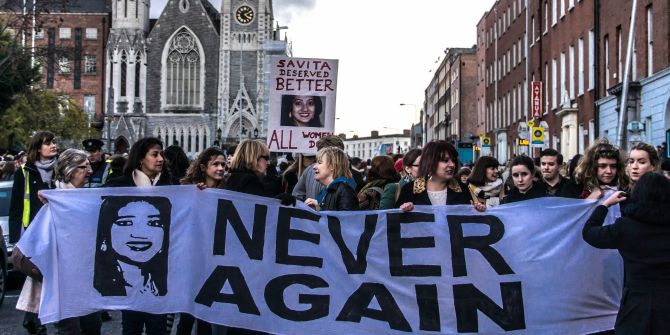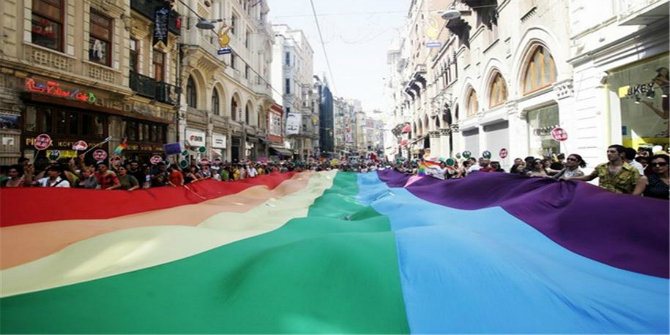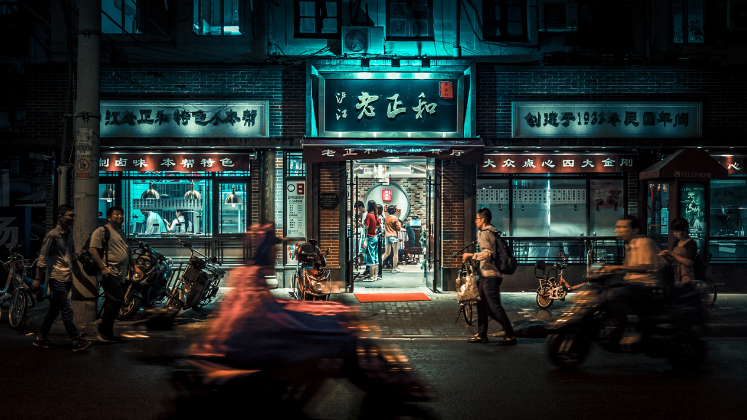
This edited volume is not a comprehensive overview of the role and experience of sexual politics in modern Ireland, but rather a diverse range of topics that explores the gaps in gender studies within Irish history, writes Muireann O’Dwyer. Sexual Politics in Modern Ireland sets out to explore gender, sex and sexuality using new data to explore stories that have yet to be told, and to add to our understanding of who and what make up Irish society.
Sexual Politics in Modern Ireland. Dr Jennifer Redmond, Dr Sonja Tiernan, Dr Sandra McAvoy, Dr Mary McAuliffe (Eds.). Irish Academic Press. 2015.
Sexual Politics in Modern Ireland, an edited collection resulting from the 2011 conference of the Women’s History Association of Ireland, seeks to further the project of exploring the role of gender, sex and sexuality in the history of modern Ireland. Edited by historians based in the UK and Ireland, the book is part of an on-going revisiting of Irish history, exploring the gaps and silences that typified academic history for generations. It follows other similar books, collections of papers from previous conferences, or stand alone volumes seeking to address the gendered lacunae of Irish history. As such, it is not a comprehensive overview of the role and experience of sexual politics in modern Ireland, as the title may suggest. In this way, the contributions are less connected than you might expect. However, it is precisely this diversity, and this range, which gives the book its strength. The book offers contributions that scope from an exploration of courtship amongst Irish elites; the interaction between sex and emigration; sex education in schools; abortion politics; lesbian sub-culture in the prison factories of Van Diemen’s Land; and the experiences of intersex people in Ireland. Clearly such a variety responds to gaps not only in Irish history, but even in contemporary feminist history by moving beyond an essentialist idea of women to incorporate investigations that reflect the diverse and multiple identities and experiences of women in history.
The book sets out to explore gender, sex and sexuality in an explicitly political way. It does not only look to see the role of women, and gender itself, in the politics of the time under study, but through the contributions it seeks to “weave a narrative that sees gender and encounters with the political sphere, or the politicisation of gender in the public sphere, as an important paradigm for understanding how people were shaped by and sought to shape their society”. As such, there are two clear themes that can be drawn from the book – the first is in uncovering silences and silenced stories. This thread draws on new data, or on new approaches, to explore stories that have yet to be told, and to add to our understanding of who and what make up Irish society, such as the chapter on female prisoners and the contribution on intersex in Ireland. The second theme concerns the very political nature of gender, and uses the politicisation of gender as a lens through which to look at history, such as in the contribution on the emigrant experience, or the chapter on the politics of the abortion debates.

Bláthnaid Nolan’s chapter, which opens the collection, is a prime example of utilising new data to explore a facet of history that has so far been rendered invisible. Drawing on documents from the factories in Van Diemen’s land, including official reports and worker interviews, this contribution explores the idea of a lesbian subculture in the women’s factories. References to specific practices, as well as evidence of the development of a widely understood vernacular that developed in tandem, give support to her argument that there was a lesbian subculture in these factories. Most interestingly, she highlights the miscellany of reasons for the women’s engagement with this subculture, ranging from a pre-existing or newly discovered sexual desire, to a political statement against the authority, or even simply as a coping mechanism.
Gender, sex and sexuality are never more politicised in contemporary Irish society than in the debates over abortion. As such, Mary Muldowney’s chapter on pro-choice activism since 1983 will be read with interest. Drawing on oral histories of pro-choice activists involved in the various campaigns, referenda and controversies surrounding the abortion question, she traces shifts in attitudes towards abortion and towards female sexuality more generally. The oral histories offer a rich account, and a different perspective to one based primarily on newspaper reports, for example. The chapter covers events all the way up to the current debates, with the death of a woman, Savita Halappanavar activating a new generation of pro-choice campaigners. This story is one that is clearly still being told, and work such as Muldowney’s is essential to understanding how this debate has evolved. However, as she herself notes, given the stigma attached to abortion, and the fact that Irish women are availing of abortion outside of Ireland, the story remains partial, and it will be some time before the silences of this issue are truly removed.
A feminist legal scholar, Robin West, once described the project of feminist academic work as “unmasking the patriarchy.”[1] It’s a useful phrase for evaluating this book. It successfully uncovers the role of gender in the politics of the modern Irish society, and in particular it explores how power, in various forms, has sought to control and police gender, sexuality and sex in different contexts. This attention to power is what makes this a profoundly political text. This book will be read with interest by scholars of women’s history more broadly, but also by those interested in coming to a fuller appreciation of the history of modern Ireland, and indeed by anyone interested in how gender and politics have, and continue to, intersect in Irish society.
Muireann O’Dwyer is a Government of Ireland Scholar and PhD candidate, based in the School of Politics and International Relations in University College Dublin. She is in the PhD in European Law and Governance programme, which is involves engagement with the School of Law as well as with the school of Politics and International Relations. Her work focuses on building a feminist evaluation of new forms of EU governance, and aims to be intensively interdisciplinary. She holds degrees from NUI Galway (BA), UCL (MSc) and UCD (MEconSc). She tweets @mergito
[1] West, R. (1988). Jurisprudence and gender. The University of Chicago Law Review, 1-72.








1 Comments